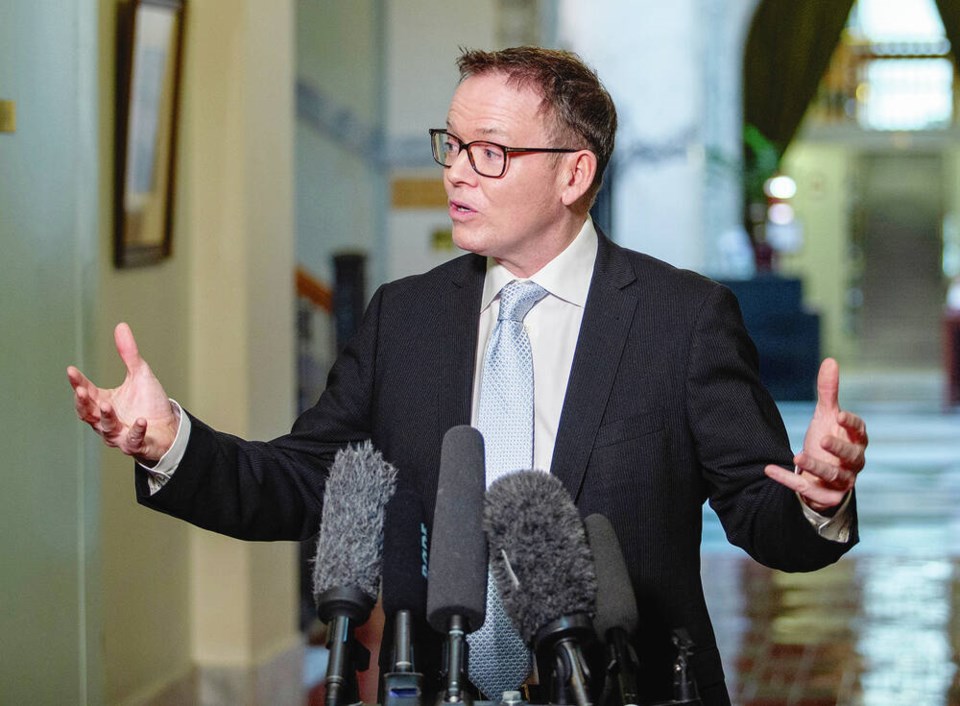BC United Opposition Leader Kevin Falcon says he would ban open drug use in hospitals, as a provincial task force that aims to standardize smoking prohibitions and use of illicit drugs in hospitals met for the first time Thursday.
“It would take five minutes to solve this problem and just say no — absolutely no,” said Falcon. “No smoking of drugs, no open drug use in the hospitals, full stop, and it would happen immediately.”
Falcon, a former health minister, said smoking of drugs in hospitals should no more be tolerated than smoking of cigarettes, adding patients addicted to drugs don’t have the right to do whatever they want in a hospital setting while receiving care.
“We would enforce the safety of patients and workers over the rights of an individual who believes they have a right to use crack or smoke meth or do heroin,” he said.
In the past, medications were given to patients to manage their withdrawal symptoms and cravings, he said — something the B.C. Nurses’ Union has suggested as one option.
The union has said while no-smoking rules in hospitals were mostly observed before, they largely haven’t been since possession of small personal amounts of drugs was decriminalized in B.C. as part of a three-year pilot project, set to conclude in 2026.
Falcon said nurses have too much to do already without “potentially violent, unstable patients, high on who knows what kind of drugs” threatening their safety.
B.C. Health Minister Adrian Dix, in Vancouver on Friday, called Falcon’s five-minute solution “disrespectful to the most vulnerable people we work with and to the health professionals who’ve devoted their lives to helping them.”
Dix said all manner of people seek treatment in hospital and that presents real challenges.
“It’s not like Rogers Arena, if some fan is disorderly, you send them home,” said Dix. “This is a hospital, and our health care staff is absolutely committed to their patients, all of their patients.”
The health minister said he doesn’t believe “the solution to this is putting critically ill people on the street” and while Falcon may suggest that for political points, Dix said he doesn’t believe that’s what the people of B.C. or nurses or doctors or heath-care workers want.
The Health Ministry says it has met with health authorities to begin to standardize policies across the province, including those to ensure illicit drugs are only used in designated spaces within or around the hospital, or under direction of the health-care team.
The task force, which includes representatives from each health authority, public health officials and the Health Ministry, will work on information given to patients and visitors reinforcing that smoking is prohibited and their responsibilities related to drug possession and use.
“It is never acceptable — never acceptable — in the hospital to smoke anything,” said Dix.
“It’s never acceptable if our staff people or our other patients are affected by secondhand smoke.”
The task force will also aim to improve harm-reduction strategies in care plans for those identified as at a high risk for using unregulated drugs while in hospital.
No decisions have been made on the rules around designated areas for drug consumption or establishing such sites — which formally or informally exist at some hospitals — or whether they would exist at every hospital site, Dix said.
“That task force will have at top of mind interest all of the patients in the hospital and all those working in hospital,” said Dix.
Staff training and education will be streamlined across the province and better risk assessments will be performed to understand, document and communicate a patient’s substance-use history, the Health Ministry said.
“This will help us further support staff as we manage the patient’s addiction and potential need for unregulated drugs during the patient’s care, ” it said.
The task force will aim to expand oversight and monitoring to ensure security interventions are taking place, and help health authorities develop ways to improve how unregulated drug use is documented, reported and addressed.
Fourteen violence-prevention leads and 320 security officers have been hired for 26 high-risk sites across B.C.
Falcon said more security wouldn’t be necessary if “the underlying problem” was dealt with.
The task force was created after a leaked memo from Northern Health about illicit drug use in hospitals was made public, kicking off a series of public complaints by nurses about being exposed to intoxicating smoke, drug deals, fentanyl-fuelled behaviours and drug paraphernalia.
Dix said in a statement that the ministry will “take stronger action to protect staff and patients from exposure to drug related harms” through enforcement, training, and better communication.
“We have a zero-tolerance policy for this behaviour — it’s absolutely not allowed,” said Dix.
At Victoria General Hospital, patients are given lockboxes to store unregulated substances and harm-reduction supplies so they don’t pose a risk to other patients and staff.
Victoria General has installed about 20 smoke detectors, including in the emergency department and maternity ward, where one VGH nurse said patients are known to smoke drugs.
>>> To comment on this article, write a letter to the editor: [email protected]



